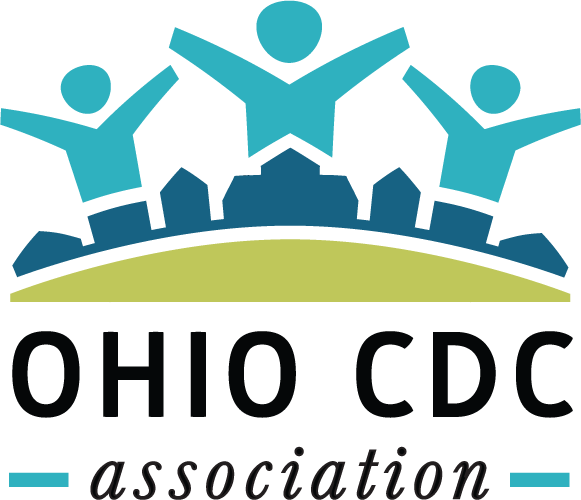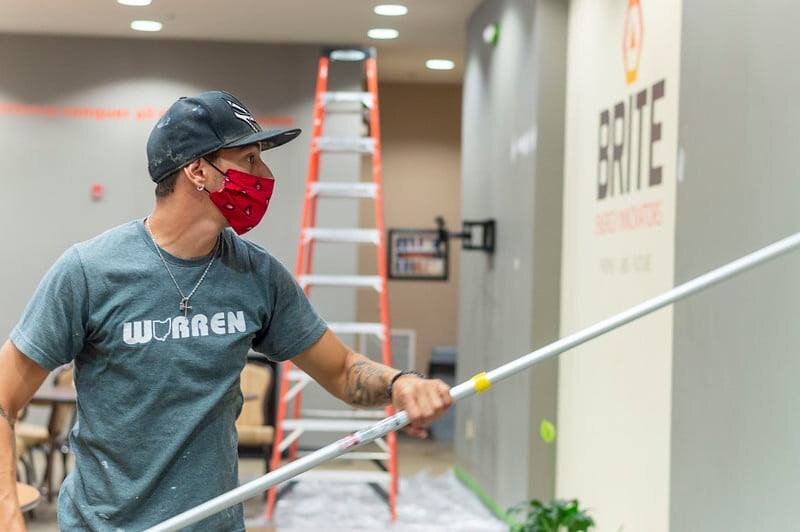Main Street Job Recovery Program
July 12, 2022: OCDCA to provide $500,000 in grant funding for three Ohio nonprofits.
Ohio CDC Association (OCDCA) today announced three Ohio nonprofits - CleveLawn, Co-Op Dayton, and Community Development For All People (CD4AP) - will be awarded $500,000 in state funding through The Main Street Job Recovery Program for job creation efforts to benefit local communities. Read our official press release here.
March 29, 2022: OCDCA, through ODOD, launches the Main Street Job Recovery Program
OCDCA is excited to launch this program we worked hard to advocate for! Learn more about the Main Street Job Recovery Program as a funding opportunity.
July 1: Main Street Job Recovery Program Included in Budget
The final budget included $500,000 in funding for the Main Street Job Recovery Program that will provide state funds for community development organizations that address the economic needs of low -and moderate-income individuals and families through the creation of permanent business development and employment opportunities. The program will focus on creating jobs for Ohioans while rebuilding neighborhoods by addressing priorities such as blight remediation, vacant properties, housing, and the reentry population. Although the final amount was not the goal this is still positive as it’s rare to have new programs funded on the first attempt. Efforts are underway to increase this amount through American Rescue Plan Act funds. We were pleased with the amount of bipartisan support in both the House and Senate. OCDCA would like to thank all of the members that advocated to their legislators and the organizations that signed on in support!
April 13: Main Street Job Recovery Program Included in House Budget
The Main Street Job Recovery Program will provide state funds for nonprofit organizations that address the economic needs of low-and moderate- income individuals and families through the creation of permanent business development and employment opportunities. The program will focus on creating jobs for Ohioans while rebuilding neighborhoods by addressing priorities such as blight remediation, vacant properties, housing, and the reentry population.
We’re pleased that a bipartisan group of 10 submitted the proposed amendment to the House budget version that include Rep Rick Carfagna (R-Genoa Township), Rep Sara Carruthers (R – Hamilton), Rep Jeff Crossman (D – Parma), Rep Laura Lanese (R – Grove City), Rep Lepore-Hagan (D – Youngstown), Rep Gayle Manning (R – North Ridgeville), Rep Mike O’Brien (D – Warren), Rep Tom Patton (R – Strongsville), Rep Jean Schmidt (R – Miami Township), Rep Bride Rose Sweeney (D – Cleveland). The program was included in the House-passed budget but at a lower than requested amount of $500,000 a year. This is still positive as it’s rare to have new programs funded in the budget. Efforts are underway to increase this amount in the Senate and to access state resources for community development in the American Rescue Plan Act.
March 21: Main Street Job Recovery Program Update
Ohio CDC Association (OCDCA) is advocating for the Main Street Job Recovery Program at the Statehouse during this budget season in order to increase resources for community development organizations.
We’re pleased that a bipartisan group of 10 submitted the proposed amendment to the House budget version that include Rep Rick Carfagna (R-Genoa Township), Rep Sara Carruthers (R – Hamilton), Rep Jeff Crossman (D – Parma), Rep Laura Lanese (R – Grove City), Rep Lepore-Hagan (D – Ytown), Rep Gayle Manning (R – North Ridgeville), Rep Mike O’Brien (D – Warren), Rep Tom Patton (R – Strongsville), Rep Jean Schmidt (R – Miami Township), Rep Bride Rose Sweeney (D – Cleveland). If you or your organization are represented by one of the below reps, will you please send them a quick email thanking them? Look up your Rep quickly to know for sure who they are.
About the Main Street Job Recovery Program
The Main Street Job Recovery Program will create employment opportunities, support small businesses and startups, and increase self-sufficiency among Ohioans—particularly those with low- to moderate-incomes (LMI) – while working to strengthen and restore the community.
The initiative will build on and augment the federal government’s existing Community Economic Development (CED) grant program and address the economic needs of residents through the creation of permanent businesses and job opportunities. The state program will support community efforts that drive catalytic investment that is needed most on Ohio’s Main Streets.
OCDCA is advocating for the Main Street Job Recovery Program at the Statehouse during this budget season in order to increase resources for community development organizations to rebuild their communities around the state.
Read the Main Street Job Recovery Program Support Letter
May 2021
Honorable Senate President Matt Huffman
1 Capitol Square, 2nd Floor
Columbus, OH 43215
Dear Senate President Huffman,
As a member of the Ohio CDC Association, we write to ask for your support for creation of the Main Street Job Recovery Program in the biennial operating budget. Our organizations are locally based rural and urban non-profits that work to rebuild neighborhoods through initiatives such as economic development, affordable housing, financial counseling and local food access.
Ohio communities have been hard-hit by the ongoing pandemic. With unemployment numbers continuing to increase and businesses being forced to close their doors permanently, now is the time to invest in catalytic programs to rebuild Ohio communities.
The Main Street Job Recovery Program will provide state funds for nonprofit organizations that address the economic needs of low-and moderate- income individuals and families through the creation of permanent business development and employment opportunities. The program will focus on creating jobs for Ohioans while rebuilding Main Streets by addressing priorities such as blight remediation, vacant properties, housing, and the reentry population. The Development Services Agency will administer the program and work with grantees to track the impact on these metrics. Program success will be measured based on the number of businesses created and expanded, the number of jobs created, and the amount of funds leveraged as a result of the Main Street Job Recovery Program.
We know this is a successful model because it is similar to the federal Community Economic Development grant program housed under the U.S. Department of Health & Human Services. CED awards funds to private, non-profit organizations that are community development corporations, including faith-based organizations, that have as their principal purpose planning, developing or managing low-income housing or community development projects to create employment opportunities that lead to increased self-sufficiency for individuals with low income.
On average, one Ohio nonprofit community development organization has been awarded a CED grant each year. Currently, five community development organizations have seven active CED grants awarded over the past five years totaling just under $5 million. These projects are self-sustaining as nonprofit recipients have leveraged an additional $80 million in public and private funds for job creation and revitalization efforts.
Funding for the federal program is limited and competition nationwide is fierce for these grants. Sub. House Bill 110 includes $250,000 each fiscal year for this program, which would support two projects over the biennium. We ask for your support of an amendment to increase the appropriation to $1.5 million each fiscal year, that would support up to 14 project sites in rural, suburban and urban areas of the state, and would generate up to an additional $20 to $30 million in private investment.
Nonprofit organizations are uniquely positioned to spur economic development by leveraging public resources to draw additional private investments. It is difficult to assess the total impact that COVID-19 has had on Ohio’s economy, but we know that countless Ohioans and their communities have suffered through this crisis, and it will take strategic, local-driven actions to rebuild our great cities, counties, villages, and townships.
Please support creation of the Main Street Job Recovery Program to create a powerful tool for Ohio communities to create permanent skilled jobs while strengthening and restoring their communities.
Sincerely,


